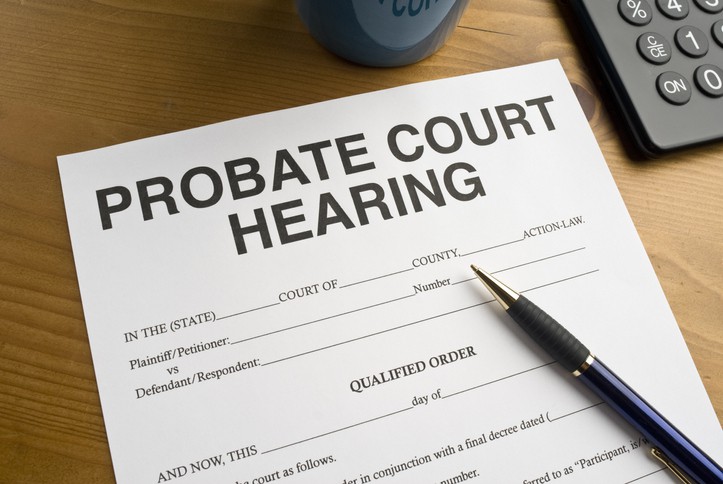When someone close to you passes away, there may be some steps needed to handle the decedent’s estate and wrap up his affairs properly. Here are eight common signs that you need a probate attorney. If any sound like your situation, then proceed directly to the bottom of this list for the next step to get you the clarity you need right now.
#1: A Bank Requests Letters of Office
If the deceased had a bank account or a safety deposit box, the bank likely will require that the executor of the will provide Letters of Office. A Letters of Office are issued by the probate court, and indicate that a certain individual is authorized to deal with the affairs of the deceased person. The bank will then see that the person named in the Letters of Office is, in fact, the person they are supposed to be talking to regarding the accounts or safety deposit box in the name of the person who has died.
#2: The Deceased has Bank or Brokerage Accounts
If the decedent has bank or brokerage accounts, an executor can expect the financial institutions will request proper documentation. In the state of Illinois, if a deceased individual had over $100,000 in total assets in his name, probate is going to be required. If he had less than $100,000 in total assets titled to him, then it may be possible to use a small state affidavit to avoid probate. Whether probate is ultimately required or not, having a conversation with a probate attorney about the total amount of the decedent’s holdings and what steps to take can be immensely valuable. A probate attorney can help the executor assess next steps and prepare any essential documentation.
#3: The Deceased has Over $100,000 in Assets
While bank and brokerage accounts are one way to reach the $100,000 threshold, other personal property also can trigger the need for probate. Did the decedent own, for example, pieces of art, cars, boats, planes, rare stamp and coin collections, sports memorabilia, or other collections? These assets can have substantial value, and either alone or in combination with financial holdings, can result in a probate proceeding.
#4: The Deceased Owns Real Estate
In most cases, real estate owned by the decedent individually must go through probate to allow the adjudication and transfer of title to the decedent’s heirs or legatees.
There are some exceptions to probate, such as if the decedent had prepared and recorded a Transfer on Death Instrument, or TODI. A TODI allows real estate owned by an individual to pass without need for probate. Also, real estate held in a trust or land trust would be administered according to the terms of the trust agreement, rather than through probate. Finally, if the decedent owned the property together with another person in joint tenancy, then the surviving joint tenant would become the owner of the property. Of course, this sparks the question of what steps that person should take from an estate planning perspective in order to avoid putting his or her heirs into the position where a probate is required.
A probate attorney can provide guidance as to how the real estate is titled, and what steps, if any, need to be taken.
#5: The Deceased has Unmet Obligations or Liabilities
Bills. Expenses. Loans. If these liabilities are out there, there could be claims by creditors who want to get paid. Are these claims valid and properly made? Are they timely or not? A probate attorney can assist with these types of questions.
#6: The Deceased has Children Under Age 18
Children under the age of 18 need a guardian, if neither parent has survived. Therefore, a guardian would need to be appointed and properly designated. Hopefully, during his life the decedent nominated someone well-suited to serve in that capacity. If not, there would be an additional process to identify and appoint somebody able to serve as guardian, as minor children may not be left to fend for themselves.
#7: The Deceased has Business Interests
When the decedent owned a closely-held business, either individually or with others, a few vital questions need to be addressed, such as:
- Will the business continue?
- Would business assets go to waste if allowed to sit or not acted upon immediately?
- How will the business or business interest be sold or transferred? Are agreements in pace for any transfer, valuation, or sale?
Any business interests should be discussed with a probate attorney to best preserve their value.
#8: The Deceased has Pending Claims or Litigation
If the decedent has an ongoing court case, or has claims that could be litigated, they become matters for the estate to pursue. These can vary from business and commercial claims to personal injury cases resulting from accidents or improper care. In any event, the estate would need somebody to make decisions on the course of litigation and on those claims. A probate attorney can help you analyze the best course of action on such claims, as well as the time in which to do so.
Do any of these signs appear to apply?
If so, contact us at Windy City Legal for a consultation specific to your particular situation. Even if you think you are entirely outside of probate, a strategy session can help ensure you’re taking the necessary steps for the estate.










